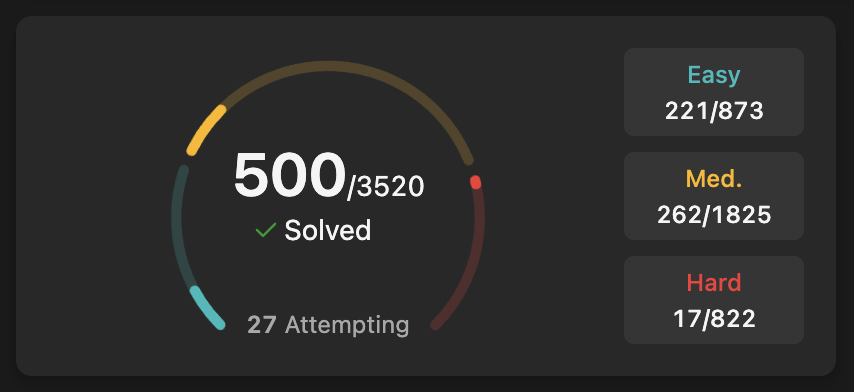- Published on
My New LeetCode Approach

After a year of doing LeetCode inconsistently, I think I’ve finally found an approach that works for me.
🧠 Why My Old Approach Didn't Work
In the past, I tried:
- 🔄 Grinding random problems — lacked structure, and the difficulty curve often outpaced my level.
- 🧩 Pattern-based learning (like Grokking) — helped me recognize templates, but:
- It became overwhelming when problems were too advanced.
- It made me hesitant when facing novel problems that didn’t fit any known pattern.
I also fell into common traps:
- Copy-pasting GPT solutions or relying too heavily on NeetCode videos.
- Mistaking solution memorization for real understanding.
- Measuring progress by problem count instead of actual skill growth.
🎯 My New Strategy
✅ Solve problems just above your level
- I aim for problems around +50 above my LeetCode contest rating.
- This keeps things challenging but not discouraging.
- These problems stretch my understanding without overwhelming me.
How to get your ELO?
Just do a few LeetCode contests — they’ll give you a rating that reflects your current level better than problem count ever could.
🔧 What I’m Doing Differently Now
📈 Structured ladders:
I'm following the ZeroTrac rating ladder, which provides a clean progression of difficulty.🎯 Full focus this summer:
I'm going all-in on LeetCode — no balancing it with school or work this time.🕒 Fixed daily schedule:
I block off 1–3 hours at the same time every day for LeetCode to build consistency.🧠 Long-term mindset:
This isn’t a sprint. I’m building a long-term skillset that compounds over time.
🧪 What I’ve Tried Before
🧩 Pattern-based learning:
Grokking the Coding Interview gave me a strong base in key patterns. But some of the questions near the end of the chapter that were just too challenging sometimes for my current level for me to come up with on my own.🗂️ Active recall + spaced repetition:
I used Anki to drill questions, but it often led to surface-level memorization.
I’ve found it's better to encounter slightly varied versions of patterns in the wild to build deeper intuition.
✍️ What's Next
I plan to write a follow-up post in August to share how this new system worked out over the summer. Hopefully, I’ll have some real results - and maybe a few new insights to pass on. Ok. More soon.